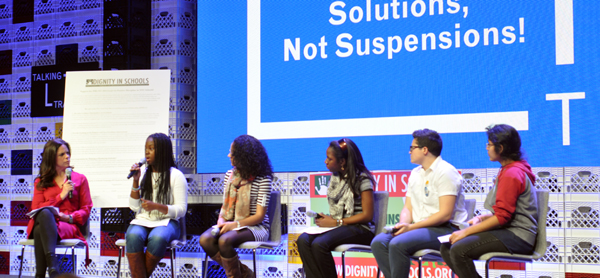
Cheyanne speaks at Talking Transition with news anchor Soledad O’Brien.
With the election only two weeks behind us, MRNY members are hard at work setting the agenda for our next mayor, City Council and citywide elected officials. We kicked off “Talking Transition” with a low-wage worker forum; our attorneys are staffing a Single Stop clinic around the clock at the Transition tent[1]; and yesterday, our youth joined the Transitions conversation to bring education and police reform issues into the spotlight for the new elected officials.
Today, 17-year-old youth leader Cheyanne Smith, was profiled in the New York Times for her leadership to make NYC schools more respectful, safe, and dignified places for learning. Read more in “The Mayor of Teenagers.”
For the past three years, Cheyanne and other youth at MRNY have been working with groups across the city to implement a “restorative justice” disciplinary model in their schools that uses mediation and guidance approaches to discipline in order to keep students in school, rather than use punitive measures that push students into the criminal justice system.
They are working to make these reforms a central priority for the next mayor to ensure that students are part of the decision-making around safety and discipline and thateducators — not police officers who are poorly trained to deal with young people — have control over discipline in their schools.
Cheyanne was selected out of 200 nominees as someone who is an anchor for her community and, as the Times put it, “a mover and a shaker for youths’ rights.“
Speaking on a panel at Talking Transition in Manhattan yesterday, with television anchor Soledad O’Brien, Cheyanne said, “Students lack a quality education in NYC because they don’t have access to resources, support, college readiness courses, and a voice in decisions that affect them. On top of that, students of color from low-income communities are criminalized and pushed out of their schools. This is not a recipe for success. Our schools need to build a sense of community, with students, teachers and administrators working to create a positive school environment together.”
When the 5,200 police personnel stationed inside NYC schools amount to our country’s 5th largest police force and far exceed the number of guidance counselors available to students; when minor infractions like writing on a desk can put a student in handcuffs; and when more students are being suspended and arrested annually than are graduating ready for college, then something has to change.[2]
Read more about Cheyanne and this important work in the New York Times.
[1] Don’t forget to stop by Talking Transition tent on Canal Street, where you can make your voice heard in the conversation and also access legal services from our partner table with Single Stop USA.
[2] NYCLU: “A Look at School Safety.“
